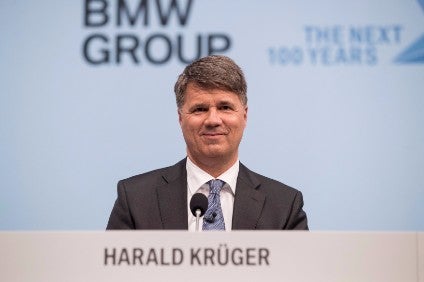
As German car makers plead their case to the government, BMW chairman Harald Kruger said that future mobility will definitely depend on diesels because environmental protection has several dimensions: one of them is the fight against climate change.
Modern, efficient diesel engines ensure lower CO2 emissions and therefore make an important contribution to protecting the environment. In addition, when it comes to many unwanted emissions, diesels are just as clean or even cleaner than petrol engines, Kruger claimed.

Discover B2B Marketing That Performs
Combine business intelligence and editorial excellence to reach engaged professionals across 36 leading media platforms.
This can certainly be said of particulate, hydrocarbon and carbon monoxide emissions, meaning that three of the four major diesel pollutant issues have been resolved and no longer have any adverse effect on air quality. This is why the group is calling for objective discussions based on facts and scientific evidence.
In this context, the group supports the comprehensive measures of the German National Diesel Forum aimed at further improving air quality in cities.
It also is preparing an EU-wide fleet renewal campaign which will have a positive impact on resources, the climate and the environment as a whole.
Initially until 31 December 2017, German owners of diesel vehicles that meet Euro 4 standards or earlier will be given an environment bonus of up to EUR2,000 (US$2,370) – depending on the model bought – when they trade in for a new BMW or Mini. Their chosen replacement must be either a BMW i3, a plug-in hybrid or a Euro 6-standard vehicle with CO2 emissions of up to 130 g/km (in the NEDC). This special campaign will begin before the end of August. The bonus is in addition to any other government incentives.
Averaged across the fleet, group diesel vehicles emit 40% less NOx than the German average, as reported by the Germany Federal Environment agency in April 2017. These figures are true for both Euro 5 and Euro 6 vehicles, BMW claims. In addition, experience gained through actual on-road driving between 2010 and 2015 means the group can offer an additional optimisation of the exhaust treatment system for 225,000 of the Euro 5 models currently on the road in Germany – at no charge to owners.
The group is investing in the Sustainable Urban Mobility fund and is using the opportunities offered by digitalisation to support major cities to better handle increased traffic volumes, thereby reducing emissions. Based on projects like the strategic partnership with Hamburg on the roll out of electric mobility and the research project City2Share with Munich and Hamburg, the group is intensifying its talks with municipal authorities in order to establish better conditions for increased electric mobility and car sharing.
Kruger said: "For almost two years now, diesel technology which is cutting edge, highly efficient and popular with customers has been deliberately and publicly discredited. This has caused tremendous uncertainty among millions of drivers and it's not going to get us anywhere. The German automotive industry will remain strong in innovation: we will provide tomorrow's mobility solutions."
The group has repeatedly claimed its exhaust treatment technologies are very different from others available in the market and the company continues to seek true competition in this area. It categorically rejects allegations made by some media of non-compliant technology employed in diesel exhaust-treatment systems.
"Investigations by authorities at home and abroad confirm that vehicles by the group are not rigged for testing purposes," Kruger said.
In addition to the ongoing optimisation of the internal combustion engine, the group is forging ahead with electric mobility. Later, flexible vehicle architectures and manufacturing facilities will allow it to decide at short notice which models and volumes to produce with what type of drive: highly efficient combustion-powered, plug-in hybrid or fully electric.
In 2017, the group expects sales of its electrified vehicles to top 100,000 for the first time in a single year. The company's range is currently nine with an i8 roadster to come. The Oxford Mini factory starts production of the battery-powered hatchback in 2019 and a battery BMW X3 follows in 2020. The iNEXT is due in 2021 from the Dingolfing factory which makes a lot of parts, including drivetrains, for the automaker's EVs.






